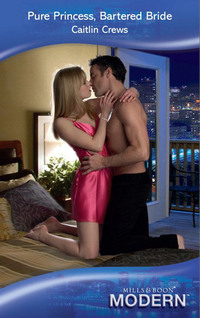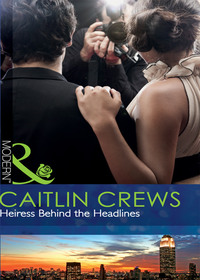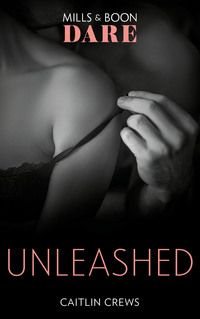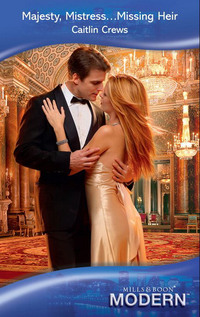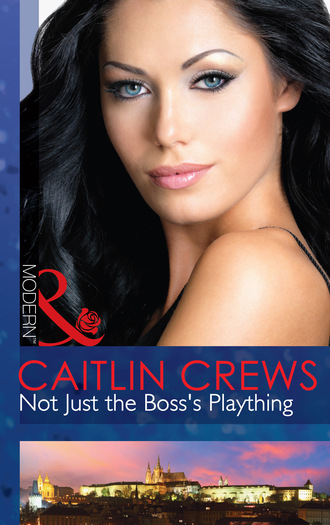
Полная версия
Not Just The Boss's Plaything

About the Author
CAITLIN CREWS discovered her first romance novel at the age of twelve and has since began her life-long love affair with romance novels, many of which she insists on keeping near her at all times. She currently lives in California, with her animator/comic book artist husband and their menagerie of ridiculous animals.
Not Just the Boss’s Plaything
Caitlin Crews

www.millsandboon.co.uk
ISBN: 978-1-472-00271-6
NOT JUST THE BOSS’S PLAYTHING
© 2013 Caitlin Crews
Published in Great Britain 2020
by Mills & Boon, an imprint of HarperCollinsPublishers 1 London Bridge Street, London, SE1 9GF
All rights reserved including the right of reproduction in whole or in part in any form. This edition is published by arrangement with Harlequin Books S.A.
This is a work of fiction. Names, characters, places, locations and incidents are purely fictional and bear no relationship to any real life individuals, living or dead, or to any actual places, business establishments, locations, events or incidents. Any resemblance is entirely coincidental.
By payment of the required fees, you are granted the non-exclusive, non-transferable right and licence to download and install this e-book on your personal computer, tablet computer, smart phone or other electronic reading device only (each a “Licensed Device”) and to access, display and read the text of this e-book on-screen on your Licensed Device. Except to the extent any of these acts shall be permitted pursuant to any mandatory provision of applicable law but no further, no part of this e-book or its text or images may be reproduced, transmitted, distributed, translated, converted or adapted for use on another file format, communicated to the public, downloaded, decompiled, reverse engineered, or stored in or introduced into any information storage and retrieval system, in any form or by any means, whether electronic or mechanical, now known or hereinafter invented, without the express written permission of publisher.
® and ™ are trademarks owned and used by the trademark owner and/or its licensee. Trademarks marked with ® are registered with the United Kingdom Patent Office and/or the Office for Harmonisation in the Internal Market and in other countries.
www.millsandboon.co.uk
Note to Readers
This ebook contains the following accessibility features which, if supported by your device, can be accessed via your ereader/accessibility settings:
Change of font size and line height
Change of background and font colours
Change of font
Change justification
Text to speech
Table of Contents
Cover
About the Author
Title Page
Copyright
Note to Readers
Dedication
CHAPTER ONE
CHAPTER TWO
CHAPTER THREE
CHAPTER FOUR
CHAPTER FIVE
CHAPTER SIX
CHAPTER SEVEN
CHAPTER EIGHT
CHAPTER NINE
CHAPTER TEN
About the Publisher
To the fabulous Sharon Kendrick, who sorted out what was wrong with an early draft of this book on a long, rainy, Irish drive to and from Sligo town (and an atmospheric tour of Yeats country)—both of which amounted to a Master Class in writing Harlequin Presents.
And to Abby Green, Heidi Rice, Fiona Harper and Chantelle Shaw, for our inspiring days in Delphi.
And to all the readers who wrote me to ask for Nikolai’s story. This is for you most of all!
CHAPTER ONE
TORTURE WOULD BE preferable to this.
Nikolai Korovin moved through the crowd ruthlessly, with a deep distaste for his surroundings he made no effort to hide. The club was one of London’s sleekest and hottest, according to his assistants, and was therefore teeming with the famous, the trendy and the stylish.
All of whom appeared to have turned up tonight. In their slick, hectic glory, such as it was. It meant Veronika, with all her aspirations to grandeur, couldn’t be far behind.
“Fancy a drink?” a blank-eyed creature with masses of shiny black hair and plumped-up lips lisped at him, slumping against him in a manner he imagined was designed to entice him. It failed. “Or anything else? Anything at all?”
Nikolai waited impatiently for her to stop that insipid giggling, to look away from his chest and find her way to his face—and when she did, as expected, she paled. As if she’d grabbed hold of the devil himself.
She had.
He didn’t have to say a word. She dropped her hold on him immediately, and he forgot her the moment she slunk from his sight.
After a circuit or two around the loud and heaving club, his eyes moving from one person to the next as they propped up the shiny bar or clustered around the leather seating areas, cataloging each and dismissing them, Nikolai stood with his back to one of the giant speakers and simply waited. The music, if it could be called that, blasted out a bass line he could feel reverberate low in his spine as if he was under sustained attack by a series of concussion grenades. He almost wished he was.
He muttered something baleful in his native Russian, but it was swept away in the deep, hard thump and roll of that terrible bass. Torture.
Nikolai hated this place, and all the places like it he’d visited since he’d started this tiresome little quest of his. He hated the spectacle. He hated the waste. Veronika, of course, would love it—that she’d be seen in such a place, in such company.
Veronika. His ex-wife’s name slithered in his head like the snake she’d always been, reminding him why he was subjecting himself to this.
Nikolai wanted the truth, finally. She was the one loose end he had left, and he wanted nothing more than to cut it off, once and for all. Then she could fall from the face of the planet for all he cared.
“I never loved you,” Veronika had said, a long cigarette in her hand, her lips painted red like blood and all of her bags already packed. “I’ve never been faithful to you except by accident.” Then she’d smiled, to remind him that she’d always been the same as him, one way or another: a weapon hidden in plain sight. “Needless to say, Stefan isn’t yours. What sane woman would have your child?”
Nikolai had eventually sobered up and understood that whatever pain he’d felt had come from the surprise of Veronika’s departure, not the content of her farewell speech. Because he knew who he was. He knew what he was.
And he knew her.
These days, his avaricious ex-wife’s tastes ran to lavish Eurotrash parties wherever they were thrown, from Berlin to Mauritius, and the well-manicured, smooth-handed rich men who attended such events in droves—but Nikolai knew she was in London now. His time in the Russian Special Forces had taught him many things, much of which remained etched deep into that cold, hard stone where his heart had never been, and finding a woman with high ambitions and very low standards like Veronika? Child’s play.
It had taken very little effort to discover that she was shacking up with her usual type in what amounted to a fortress in Mayfair: some dissipated son of a too-wealthy sheikh with an extensive and deeply bored security force, the dismantling of which would no doubt be as easy for Nikolai as it was entertaining—but would also, regrettably, cause an international incident.
Because Nikolai wasn’t a soldier any longer. He was no longer the Spetsnaz operative who could do whatever it took to achieve his goals—with a deadly accuracy that had won him a healthy respect that bordered on fear from peers and enemies alike. He’d shed those skins, if not what lay beneath them like sinew fused to steel, seven years ago now.
And yet because his life was nothing but an exercise in irony, he’d since become a philanthropist, an internationally renowned wolf in the ill-fitting clothes of a very soft, very fluffy sheep. He ran the Korovin Foundation, the charity he and his brother, Ivan, had begun after Ivan’s retirement from Hollywood action films. Nikolai tended to Ivan’s fortune and had amassed one of his own thanks to his innate facility with investment strategies. And he was lauded far and near as a man of great compassion and caring, despite the obvious ruthlessness he did nothing to hide.
People believed what they wanted to believe. Nikolai knew that better than most.
He’d grown up hard in post-Soviet Russia, where brutal oligarchs were thick on the ground and warlords fought over territory like starving dogs—making him particularly good at targeting excessively wealthy men and the corporations they loved more than their own families, then talking them out of their money. He knew them. He understood them. They called it a kind of magic, his ability to wrest huge donations from the most reluctant and wealthiest of donors, but Nikolai saw it as simply one more form of warfare.
And he had always been so very good at war. It was his one true art.
But his regrettably high profile these days meant he was no longer the kind of man who could break into a sheikh’s son’s London stronghold and expect that to fly beneath the radar. Billionaire philanthropists with celebrity brothers, it turned out, had to follow rules that elite, highly trained soldiers did not. They were expected to use diplomacy and charm.
And if such things were too much of a reach when it concerned an ex-wife rather than a large donation, they were forced to subject themselves to London’s gauntlet of “hot spots” and wait.
Nikolai checked an impatient sigh, ignoring the squealing trio of underdressed teenagers who leaped up and down in front of him, their eyes dulled with drink, drugs and their own craven self-importance. Lights flashed frenetically, the awful music howled and he monitored the crowd from his strategic position in the shadows of the dance floor.
He simply had to wait for Veronika to show herself, as he knew she would.
Then he would find out how much of what she’d said seven years ago had been spite, designed to hurt him as much as possible, and how much had been truth. Nikolai knew that on some level, he’d never wanted to know. If he never pressed the issue, then it was always possible that Stefan really was his, as Veronika had made him believe for the first five years of the boy’s life. That somewhere out there, he had a son. That he had done something right, even if it was by accident.
But such fantasies made him weak, he knew, and he could no longer tolerate it. He wanted a DNA test to prove that Stefan wasn’t his. Then he would be done with his weaknesses, once and for all.
“You need to go and fix your life,” his brother, Ivan, the only person alive that Nikolai still cared about, the only one who knew what they’d suffered at their uncle’s hands in those grim years after their parents had died in a factory fire, had told him just over two years ago. Then he’d stared at Nikolai as if he was a stranger and walked away from him as if he was even less than that.
It was the last time they’d spoken in person, or about anything other than the Korovin Foundation.
Nikolai didn’t blame his older brother for this betrayal. He’d watched Ivan’s slide into his inevitable madness as it happened. He knew that Ivan was sadly deluded—blinded by sex and emotion, desperate to believe in things that didn’t exist because it was far better than the grim alternative of reality. How could he blame Ivan for preferring the delusion? Most people did.
Nikolai didn’t have that luxury.
Emotions were liabilities. Lies. Nikolai believed in sex and money. No ties, no temptations. No relationships now his brother had turned his back on him. No possibility that any of the women he took to his bed—always nameless, faceless and only permitted near him if they agreed to adhere to a very strict set of requirements—would ever reach him.
In order to be betrayed, one first had to trust.
And the only person Nikolai had trusted in his life was Ivan and even then, only in a very qualified way once that woman had sunk her claws in him.
But ultimately, this was a gift. It freed him, finally, from his last remaining emotional prison. It made everything simple. Because he had never known how to tell Ivan—who had built a life out of playing the hero in the fighting ring and on the screen, who was able to embody those fights he’d won and the roles he’d played with all the self-righteous fury of the untainted, the unbroken, the good—that there were some things that couldn’t be fixed.
Nikolai wished he was something so simple as broken.
He acted like a man, but was never at risk of becoming one. He’d need flesh and blood, heat and heart for that, and those were the things he’d sold off years ago to make himself into the perfect monster. A killing machine.
Nikolai knew exactly what he was: a bright and shining piece of ice with no hope of warmth, frozen too solid for any sun to penetrate the chill. A hard and deadly weapon, honed to lethal perfection beneath his uncle’s fists, then sharpened anew in the bloody Spetsnaz brotherhood. To say nothing of the dark war games he’d learned he could make into his own kind of terrible poetry, despite what it took from him in return.
He was empty where it counted, down to his bones. Empty all the way through. It was why he was so good at what he did.
And it was safer, Nikolai thought now, his eyes on the heedless, hedonistic crowd. There was too much to lose should he relinquish that deep freeze, give up that iron control. What he remembered of his drinking years appalled him—the blurred nights, the scraps and pieces of too much frustrated emotion turned too quickly into violence, making him far too much like the brutal uncle he’d so despised.
Never again.
It was better by far to stay empty. Cold. Frozen straight through.
He had never been anything but alone. Nikolai understood that now. The truth was, he preferred it that way. And once he dealt with Veronika, once he confirmed the truth about Stefan’s paternity, he would never have to be anything else.

Alicia Teller ran out of patience with a sudden jolt, a wave of exhaustion and irritation nearly taking her from her feet in the midst of the jostling crowd. Or possibly that was the laddish group to her left, all of them obviously deep into the night’s drinking and therefore flailing around the dance floor.
I’m much too old for this, she told herself as she moved out of their way for the tenth time, feeling ancient and decrepit at her extraordinarily advanced age of twenty-nine.
She couldn’t remember the last time she’d spent a Saturday night anywhere more exciting than a quiet restaurant with friends, much less in a slick, pretentious club that had recently been dubbed the place to be seen in London. But then again, she also didn’t like to look a gift horse in the mouth—said gift horse, in this case, being her ever-exuberant best friend and flatmate Rosie, who’d presented the guest passes to this velvet-roped circus with a grand flourish over dinner.
“It’s the coolest place in London right now,” she’d confidently assured Alicia over plates of saag paneer in their favorite Indian restaurant not far from Brick Lane. “Dripping with celebrities and therefore every attractive man in London.”
“I am not cool, Rosie,” Alicia had reminded her gently. “You’ve said so yourself for years. Every single time you try to drag me to yet another club you claim will change my life, if memory serves. It might be time for you to accept the possibility that this is who I am.”
“Never!” Rosie had cried at once, feigning shock and outrage. “I remember when you were fun, Alicia. I’ve made a solemn vow to corrupt you, no matter how long it takes!”
“I’m incorruptible,” Alicia had assured her. Because she also remembered when she’d been fun, and she had no desire to repeat those terrible mistakes, thank you, much less that descent into shame and heartache. “I’m also very likely to embarrass you. Can you handle the shame?”
Rosie had rolled her extravagantly mascaraed and shimmery-purple shadowed eyes while tossing the last of the poppadoms into her mouth.
“I can handle it,” she’d said. “Anything to remind you that you’re in your twenties, not your sixties. I consider it a public service.”
“You say that,” Alicia had teased her, “but you should be prepared for me to request ‘Dancing Queen’ as if we’re at a wedding disco. From the no doubt world-renowned and tragically hip DJ who will faint dead away at the insult.”
“Trust me, Alicia,” Rosie had said then, very seriously. “This is going to be the best night of our lives.”
Now Alicia watched her best friend shake her hips in a sultry come-on to the investment banker she’d been flirting with all night, and blamed the jet lag. Nothing else could have made her forget for even a moment that sparkly, dramatic still Rosie viewed it as her sacred obligation to pull on a weekend night, the way they both had when they were younger and infinitely wilder, and that meant the exorbitant taxi fare back home from the wilds of this part of East London to the flat they shared on the outskirts of Hammersmith would be Alicia’s to cough up. Alone.
“You know what you need?” Rosie had asked on the chilly trek over from the Tube, right on cue. “Desperately, I might add?”
“I know what you think I need, yes,” Alicia had replied dryly. “But for some reason, the fantasy of sloppy and unsatisfying sex with some stranger from a club pales in comparison to the idea of getting a good night’s sleep all alone in my own bed. Call me crazy. Or, barring that, a grown-up.”
“You’re never going to find anyone, you know,” Rosie had told her then, frowning. “Not if you keep this up. What’s next, a nunnery?”
But Alicia knew exactly what kind of people it was possible to meet in the clubs Rosie preferred. She’d met too many of them. She’d been one of them throughout her university years. And she’d vowed that she would never, ever let herself get so out of control again. It wasn’t worth the price—and sooner or later, there was always a price. In her case, all the years it had taken her to get her father to look at her again.
Alicia had been every inch a Daddy’s girl until that terrible night the summer she’d been twenty-one. She’d been indulged and spoiled and adored beyond measure, the light of his life, and she’d lost that forever on a single night she still couldn’t piece together in her head. But she knew the details almost as if she could remember it herself, because she’d had to sit and listen to her own father tell them to her the next morning while her head had pounded and her stomach had heaved: she’d been so drunk she’d been practically paralytic when she’d come home that night, but at some point she’d apparently wandered out into the back garden—which was where her father had found her, having sex with Mr. Reddick from next door.
Married Mr. Reddick, with three kids Alicia had babysat over the years, who’d been good mates with her dad until that night. The shame of it was still scarlet in her, bright and horrid, all these years later. How could she have done such a vile, despicable thing? She still didn’t know.
Afterward, she’d decided that she’d had more than enough fun for one lifetime.
“Sorry,” Alicia had said to Rosie then, smiling the painful memories away. “Are you talking about love? I was certain we were talking about the particular desperation of a Saturday night shag....”
“I have a radical idea, Saint Alicia,” Rosie had said then with another roll of her eyes toward the dark sky above. “Why don’t you put the halo aside for the night? It won’t kill you, I promise. You might even find you like a little debauchery on a Saturday night the way you used to do.”
Because Rosie didn’t know, of course. Nobody knew. Alicia had been too embarrassed, too ashamed, too disgusted with herself to tell her friend—to tell anyone—why she’d abruptly stopped going out at the weekend, why she’d thrown herself into the job she hadn’t taken seriously until then and turned it into a career she took a great deal of pride in now. Even her mother and sisters didn’t know why there had been that sudden deep chill between Alicia and her dad, that had now, years later, only marginally improved into a polite distance.
“I’m not wearing my halo tonight, actually,” Alicia had replied primly, patting at her riot of curls as if feeling for one anyway. “It clashed with these shoes you made me wear.”
“Idiot,” Rosie had said fondly, and then she’d brandished those guest passes and swept them past the crowd outside on the pavement, straight into the clutches of London’s hottest club of the moment.
And Alicia had enjoyed herself—more than she’d expected she would, in fact. She’d missed dancing. She’d missed the excitement in the air, the buzz of such a big crowd. The particular, sensual seduction of a good beat. But Rosie’s version of fun went on long into the night, the way it always had, and Alicia grew tired too easily. Especially when she’d only flown back into the country the day before, and her body still believed it was in another time zone altogether.
And more, when she wasn’t sure she could trust herself. She didn’t know what had made her do what she’d done that terrible night eight years ago; she couldn’t remember much of it. So she’d opted to avoid anything and everything that might lead down that road—which was easier to do when she wasn’t standing in the midst of so much cheerful abandon. Because she didn’t have a halo—God knows, she’d proved that with her whorish behavior—she only wished she did.
You knew what this would be like, she thought briskly now, not bothering to fight the banker for Rosie’s attention when a text from the backseat of a taxi headed home would do, and would furthermore not cause any interruption to Rosie’s obvious plans for the evening. You could have gone straight home after the curry and sorted out your laundry—
And then she couldn’t help but laugh at herself: Miss Misery Guts acting exactly like the bitter old maid Rosie often darkly intimated she was well on her way to becoming. Rosie was right, clearly. Had she really started thinking about her laundry? After midnight on a dance floor in a trendy London club while music even she could tell was fantastic swelled all around her?
Still laughing as she imagined the appalled look Rosie would give her when she told her about this, Alicia turned and began fighting her way out of the wild crowd and off the heaving dance floor. She laughed even harder as she was forced to leap out of the way of a particularly energetic couple flinging themselves here and there.
Alicia overbalanced because she was laughing too hard to pay attention to where she was going, and then, moving too fast to stop herself, she slipped in a puddle of spilled drink on the edge of the dance floor—
And crashed into the dark column of a man that she’d thought, before she hurtled into him, was nothing more than an extension of the speaker behind him. A still, watchful shadow.


